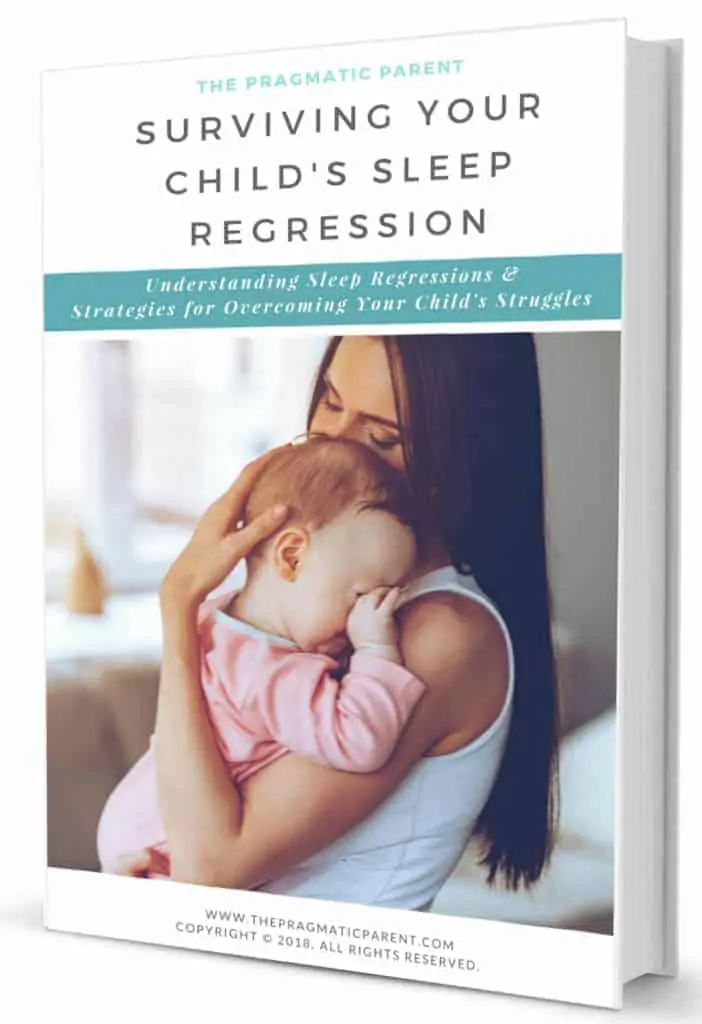Around 8 months your baby’s sleep starts to change again. 8 month sleep regression can happen between 8, 9 & 10 months, and is related to rapid development.
The 8 month sleep regression can happen anytime between 8, 9 and 10 months (which is why some also call it the 9 month sleep regression and 10 month sleep regression.) What to expect from the 8 month sleep regression and tips to help you get through it if your 8 month won’t sleep! Plus, your complete guide to Surviving all Sleep Regressions through 2 Years old.
My 8 Month Old Won’t Sleep. Help!
The 8 month sleep regression can happen anytime between 8, 9 and 10 months, which is why some sleep experts also refer to it as the 9 month sleep regression or the 10 month sleep regression.
Thankfully, this sleep regression isn’t nearly as tricky as the 4 month sleep regression or as dreaded as 18 month sleep regression, although no period of night waking and not sleeping is ever a fun time.
This particular 8 – 10 month sleep regression is one of the easier to get over, but first, here’s why this sleep regression takes place…
If You’re in a Hurry or Looking for Quick Sleep Regression Wins…
When Does the 8 Month Sleep Regression Happen… Or is it the 9 Month Sleep Regression? Or Why Won’t My 10 Month Old Sleep?
Who knew once your baby finally got the hang of sleeping, and you were finally getting more sleep at night, it would only be hindered by one sleep regression after another and everything would be thrown out of whack!
If you’re asking yourself, what the heck is going on with my baby’s sleep because everything seems out of sorts in your home, you might be going through a sleep regression which can happen anywhere between 8, 9 and 10 months old.
If might be the 8 Month Sleep Regression If Your Baby Has Begun…
- Refusing to nap
- Waking regularly at night
- Won’t go to sleep at their regular bedtime
- More hungry than normal
- Increased fussiness
- Close to a major milestone or recently hit one such as crawling, starting solids, standing up, pulling up or walking
This sleep regression is directly tied to your baby’s rapid development and the good news is, it’ll generally resolve itself on it’s own.
Think about how many changes are happening with your baby right now – trying new solid food, crawling, pulling themselves up, learning to make more sounds and communicate, as well as motor skills have ratcheted way up.
This is so exciting… but the fun makes it really hard for your 8 month old to want to go to sleep, and stay asleep.
When these rapid development periods take place, whether it’s at 8 months, 9 months or 10 months, you’ll notice your baby won’t sleep or that your 9 month old is waking up every hour.
Download Your Routine Tracker – The Starting Place for Creating a Better Routine and Great Sleep Habits
Examining the Growth Milestones of an 8 Month Olds Sleep Patterns & Major Gross Development
In general, sleep regressions are synched with learning a new skill, development and even growth spurts.
Not only is there a lot of leaps going on with their body, but their mind is growing rapidly with development and new new skills they want to practice all hours of the day.
These significant gross motor developments and mental leaps exaggerate sleep issues around the 8 month make, and make it difficult for your little one to get themselves to sleep, to self soothe or cause them to wake frequently throughout the night.
- At the 8 to 9-month mark, your baby is rapidly developing gross motor skills including scooting around, learning to crawl, pulling up on anything they can get their hands on, or standing and has become quite active.
- Your baby may also be teething which can lead to one fussy 8 month old.
- Eating more solids is a fun and exciting experience for your growing little one.
- Around 8 months old, babies communication skills explode. They may be using more sign language, babbling up a storm and sharing their feelings about what exactly they like, don’t like, want and need.
- Separation anxiety strikes around the 8 – 10 month mark and can last all the way to 18 months. With a baby’s social world expanding with new playgroups, outings and experiences, this can lead to needing reassurance and what feels like, the constant companionship of Mom and Dad.
These factors can contribute to dramatic changes in sleep patterns, but you also need to look at the environment and see if anything has changed to cause a major sleep disturbance.
Sleep Environment Contributes to the 8 Month Old Sleep Regression
What happens with your baby’s environment may also contribute to the 8, 9 and 10 month old sleep regression, especially if you’ve experienced any drastic changes recently.
Here are the most common sleep changes that can have a major impact on why your 8 month old won’t sleep:
- Is your baby going to bed at the right time to get the proper amount of sleep they need? (use this sleep chart to make sure your little on is getting the recommended hours of daily sleep with naps and night time sleep)
- Check the baby’s sleep environment (temperature too warm or cold, is the room too light, bedding, detergent, cleaning products, etc.)
- How many naps a day does your baby take? At this age, it should be two solid naps a day but are they spaced out appropriate before bedtime? (3.5 – 4 hours from end of naptime until down for bedtime is the rule of thumb)
- Do they rely on a pacifier that can be disrupting sleep if it falls out or is out of reach?
- Have you recently moved to a new home and have new surroundings?
- Allergies or intolerances to new food in their diet trying out solids?
- Overstimulation that’s causing trouble falling asleep, especially if it’s right before sleep times?
- Is your baby getting enough time to connect with you before bedtimes, especially if you work during the day?
- Are they getting enough daylight exposure during the day for their natural sleep patterns to remind them when t-it’s time to doze off?
- Is your little one being put to bed overtired, whether that’s because of too long of a stretch between nap time and bedtime, they skipped a nap, or are staying up past bedtime?
- Do you have a consistent and good bedtime routine for your baby to help settle them to sleep?
- Have you welcome a new baby to your family?
What to do To Help Your Baby Through the 8 Month Sleep Regression
The first step is to take a good look at everything going on in your baby’s life and environment.
It’s easy to assume sleep problems are due to teething or a growth spurt, but when your 8 month old or 9 month old is waking up every hour, something bigger like a sleep regression may be taking place.
However, if your baby had trouble sleeping at 4 months, 5 months, 6 months, and 7 months, the problem is likely bigger than a sleep regression and one that needs to be addressed. It’s time to get to the root of the problem such as:
- nursing to sleep so baby never learns to fall asleep on their own
- rocking baby to sleep and now they don’t know how to fall asleep on their own
- can’t get themselves back to sleep because they’ve never had to opportunity to fuss for a few minutes and see if they can do it on their own.
If you have a lingering problem that started well before the 8 month mark, it’s time to break that sleep association and rectify the problem before it goes on any longer.
How Long Does the 8 month Sleep Regression Last?
A sleep regression stage can resolve itself in as little as a few days, although they can also last up to a month.
I know that’s not what you want to hear, but this is one of the easiest sleep regressions your baby may face and because it’s tied to a developmental growth spurt, likely once the excitement wears off, your baby will be back to sleeping through the night.
The one thing you want to steer clear off during a sleep regression phase are sleep associations.
Sleep associations are little habits which can creep into your bedtime routine or middle of the night wakings, and when used often enough, can become a habit that reeks havoc on your baby’s sleep for a lot longer than the time it takes to make it through a sleep regression.
What you don’t want to do when dealing with a sleep regression stage is to let little fixes become long term habits such as co-sleeping or sitting next to your baby’s bed for an hour until they fall asleep.
Sleep associates are really tough to break because when a parent becomes a big part of a baby’s sleep routine, baby loses the ability or interest, in putting themselves to sleep.
Sleep associations stop your child from self soothing and putting themselves back to sleep if they wake in the middle of the night, or waking up too early.
Tips to Help You & Your Baby Get Through This Sleep Regression
This developmental leap will only happen once, so while it’s fun to celebrate all the milestones they’re hitting right now, try to be patient as best you can with their lack of interest in sleeping.
You’re there for support during this time and the best thing you can do is to stick with your routine, firm up your bedtime routine, and don’t make any major changes!
- Be consistent with your daily routine – keep offering naps and bedtime at the same time. If you need more help establishing a routine that’s age appropriate, Mastering Sleep & Schedules has 40+ sample routines that grow with your child all the way until school age, and can help you establish or modify your routine for one that works better.
- Establish a peaceful bedtime routine with as little stimulation as possible 30 – 60 minutes before lights out.
- Make sure the bedtime you’re using is age-appropriate for your baby’s age and sleep needs (use this baby sleep chart for the recommended number of hours of daily sleep.)
- Do your best to make sure they’re getting good naps so they’re not overtired by bedtime which can lead to night waking. Thinking you can put your baby to bed later than normal and they’ll sleep better and longer never works out how you’d expect, and almost always backfires.
- If your baby is teething, look for natural teething remedies to help during the night.
- Be patient. Major developments takes time for the excitement to wear off and there is no quick fix for sleep regressions. Only time, consistency and patience will work in your favor.
How Long Does the 8-10 Month Sleep Regression Stage Last?
In general, you’ll get past a sleep regression phase in 1 to 4 weeks, although some babies can take as long as 6 weeks before they’re back to normal sleeping patterns.
Be patient, this sleep regression is one of the easier ones to get through and all the excitement and growth your baby is going through during the daytime makes up for extra night waking.
Your Survival Guide to Sleep Regressions:
The Surviving Your Child’s Sleep Regressions eBook
You’ll know how to spot a sleep regression coming on, and be equipped with strategies to help you understand the root cause and developmental leaps behind your baby’s sleep struggle, so you all can get back to sleeping through the night quicker.
Additional Reading on This Topic of Sleep Regressions and Sleep Habits:
- Signs It’s Time to Move to One Nap a Day: How to Master the Nap Transition
- Scared of the Dark: How to Conquer Nighttime Fears
- Making the Transition to a Big Kid Bed
- How to Ease Separation Anxiety in Babies, Toddlers & Preschoolers
- 8 Common Toddler Sleep Problems & How to Handle Them
- 7 Ways to Beat Bedtime Stalling with Young Kids
- Is Your Kid Waking Up Too Early? How to Fix It
- 10 Helpful Ways to Calm the Kid Who Fights Bedtime
- Toddler Sleep Regressions: What You Need to Know About Your Two Year Old’s Sleep
- How to Establish a Peaceful Bedtime Routine for Your Baby
- How to Survive the 18 Month Sleep Regression & 2 Year Sleep Regressions Without Going Crazy
- Comprehensive Sleep Charts & Sleep Guidelines for Infants Through Adolescents
- The Benefits of Having a Daily Routine
- Create an Awesome Routine for Better Sleep Habits
Want even more?
Shop All Parenting Resources
Shop all of our parenting resources from self-regulation tools and managing big emotions to building self esteem and confidence. There are resources for all seasons of life!







